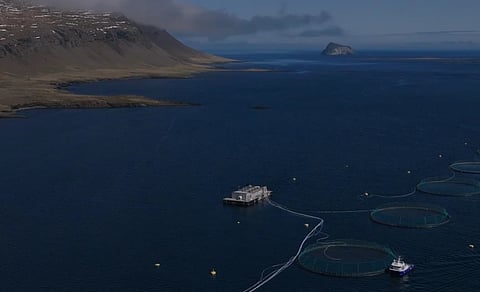

View of one of Kaldvík's salmon farms in Iceland.
Photo: Kaldvík.
Ahead of publishing its Q4 2024 report on February 26, 2025, Icelandic salmon producer Kaldvík - formerly Ice Fish Farm - reported a harvest guidance update this week in which it cut its harvest forecast for 2025 by 14%.
If in the Q3 2024 results presentation last November, Iceland's largest salmon farming company reported a harvest guidance of 25,000 tons for 2025, now, the company has reduced that amount by 3,500, setting it at 21,500 tons.
According to Kaldvík, the reasons behind this reduction are higher mortality caused by winter-wounds in the 2023 generation and less growth than expected due to lower-than-expected and normal temperatures for the period.
The company pointed out that 2023 is the last generation without both the new winter-wounds vaccine developed for Kaldvík itself and the standard ISA vaccine.
In addition, the Icelandic salmon producer said that, in recent months, it has experienced higher than expected mortality also in relation to the release of smolts to the Einstigi site, which as of January 21, 2025, is estimated at 721,000 smolts.
In this case, the main reasons identified so far are oversaturation during smolt transport and, again, lower-than-expected temperatures for the period.
Kaldvík took advantage of this harvest guidance update to also advance data for all of 2024 that will become official in February.
In its latest forecast included in the Q3 2024 report, the company said it expected to harvest approximately 15,000 tons of salmon by 2024. In the data provided now, we have learned that it ultimately harvested a total of 14,965 tons during FY2024. Of these, 6,668 tons were harvested in the fourth quarter.
The company, which unveiled a new CEO in September, announced just before Christmas that it had signed a non-binding agreement to acquire key assets in the fish farming value chain in Iceland, namely a fish box producer and a fish processing facility located on the country's east coast.
Recently, we have also learned that 2024 was a record year for the value of Iceland's aquaculture exports. Export revenues from fish farming increased by more than 16% over 2023, with salmon consolidating its position as the second-highest export value of Icelandic fish species.
